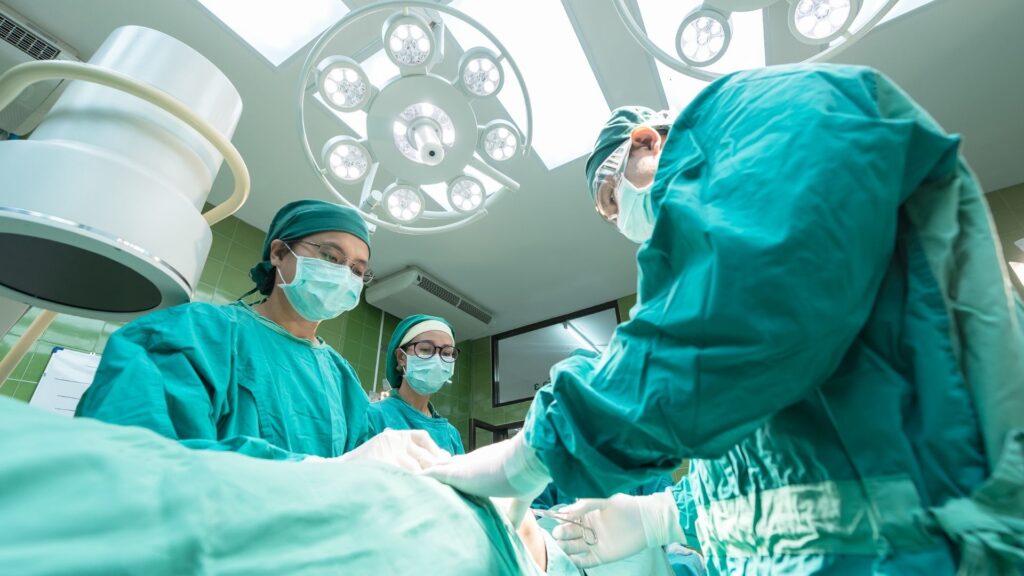
Make Your Heart Smile Again Post Surgery
Even if you have never suffered from a cardiac condition yourself, it is possible that a member of your family does. At least once in your life, you may have encountered someone who suffered from heart disease. Cardiac surgery is necessary for people with a wide variety of cardiac conditions. Heart problems include things like blocked arteries, malfunctioning valves, and irregular heartbeats. In most cases, cardiac operations are scheduled far in advance.
Recovery after heart surgery normally takes 6 to 8 weeks (about 2 months). Before being discharged, you will be given postoperative care instructions. Sirwiss collaborates with healthcare professionals who provide post-operative care; the specialists here have a lot to say about the best method to care for a patient after an intense process like open heart surgery. Continue reading to learn everything that goes into caring for someone after surgery.
Heart Procedures and Surgeries
Example for Procedures
The coronary arteries are reached by threading a special tube with a deflated balloon hooked up to them. When the balloon is blown up, it opens places where blood flows to the heart muscle has been cut off or reduced. Often done along with putting a stent in the artery to help keep it open and lower the chance of it getting blocked again. Since the body is not cut open, it is thought to be less invasive. It can last anywhere from 30 minutes to a few hours. May need to spend the night in the hospital
With thrombolysis, a chemical that breaks up clots is injected into a coronary artery to restore blood flow. This can help you survive a heart attack and get an accurate diagnosis of your condition. This process is done a few (often three) hours after a heart attack. When people have a heart attack and don’t get this treatment right away, they often need more invasive treatments like coronary angioplasty or coronary artery bypass graft surgery (CABG) to get blood back to the heart muscle.
What Is Heart Surgery?

Cardiac surgery refers to any operation performed on the heart, or the blood vessels connected to the heart. It is also known as heart surgery or cardiovascular surgery. Complex heart surgery requires the specialized knowledge of cardiac surgeons. It is a life-changing event that can enhance your heart function and circulation and give you a new lease on life. Congenital heart disease (CHD) can be corrected through cardiac surgery. Additionally, it can rectify problems that develop later in life. The type of heart surgery you undergo depends on the underlying condition or conditions.
Types of Heart Surgery
1. Aortic surgery
Surgery to repair or replace aortic aneurysms and aortic dissections.
2. Aortic valve surgery
Surgery to repair or replace an aortic valve that is not working correctly.
3. Arrhythmia surgery
A surgical procedure to correct irregular heart rhythms such as atrial fibrillation or ventricular tachycardia.
4. Congenital heart surgery
Corrective surgery to fix or treat a genetic heart defect.
5. Coronary artery bypass graft (CABG) surgery
A surgical procedure used in which the blocked portion of the coronary artery is bypassed with another piece of blood vessel.
6. Heart transplant
A surgical option to treat advanced heart failure, a condition that occurs when the heart can’t pump enough oxygenated blood to meet the needs of the body’s organs.
What Happens Before Heart Surgery?
The preparation for surgery may require weeks or months. Before scheduling cardiac surgery, your medical care team will assess your condition. Your care team will probably consist of both your primary care physician and a cardiologist. Additionally, you will consult with a cardiothoracic surgeon (a cardiac surgeon who operates on lung organs and tissues). Your care team will conduct a medical assessment.
This consists of:
1. Discussing your symptoms and how long they have persisted.
2. Discussing your medical history and the medical history of your biological family.
3. Blood analyses determine your cholesterol and other vital numbers.
4.Additionally, your team will conduct diagnostic evaluations. These exams provide a comprehensive analysis of your heart’s function and any potential problems.
In addition, they assist you and your care team to determine if and what type of surgery you require.
1. Cardiac computed tomography scan (cardiac CT).
2. Cardiac magnetic resonance imaging (heart MRI).
3. Chest X-ray.
4. Coronary angiography.
5. Echocardiogram (echo).
6. Electrocardiogram (ECG/EKG).
7. Stress test.
If you require surgery, your care team will provide detailed instructions on how to prepare and what to expect. It is essential to adhere to their recommendations regarding:
1. When to stop taking any medications.
2. When to begin fasting (not eating or drinking anything) the day before your surgery.
3. Quitting smoking or tobacco use and reducing alcohol consumption to lower your risk of complications.
4. Be sure to ask any questions you have, even if they seem small or you think you asked them already. It’s better to double-check to make sure you’re as prepared as possible for your surgery.
What Happens During Heart Surgery?
What occurs during your surgery will depend on the type you are undergoing. It also depends on the surgical technique your surgeon employs. Different techniques are used by surgeons when operating on the heart. These include open-heart surgery, bypass surgery performed off-pump, and minimally invasive heart surgery. Your care team will determine the best treatment for you and explain why.
What Happens After Heart Surgery?
After the completion of your heart surgery, you will be transferred to the intensive care unit (ICU). You will recuperate in the ICU for a minimum of one day. Then, you will be transferred to a standard hospital room for continued rest and care. The length of your hospital stay depends on the type of surgery you underwent and how your body responds to it. Everyone’s recovery is unique. Your hospital staff will keep a close watch on you to ensure that you heal properly. They are also prepared to identify and address any problems that arise.
What are the Risks or Complications of Heart Surgery?
Overall, heart surgery has an outstanding success rate. However, there are still hazards, as with any surgical procedure. Among the potential dangers and complications are:
- Allergic reaction to anesthesia.
- Arrhythmias.
- Bleeding.
- Confusion or trouble thinking clearly.
- Damage to nearby blood vessels or organs.
- Infection in your incision or inside your chest.
- Stroke.
The risks are higher if you have health conditions like:
- Diabetes.
- Chronic obstructive pulmonary disease (COPD).
- Kidney disease.
- Obesity.
- Peripheral artery disease.
Smoking and tobacco use also increase the risk of complications during and following surgery.
Recovery After Heart Surgery
The initial phase of rehabilitation from heart surgery can last between 6 and 8 weeks (about 2 months). When you are discharged from the hospital, you will receive postoperative care instructions. These will aid in your physical recovery and mental well-being.
Wound Treatment
Keep the surgical incision clean and dry. Within a few days, you should be able to take a bath or shower. It’s also essential to: Use only water and detergent to clean the area. Eat nutritious food to promote healing. Call the doctor if you experience any of the following symptoms:
1. More drainage or oozing than usual
2. Edges pulling apart
3. Redness or warmth around the cut
4. Fever greater than 100 F
You should also call your doctor when your breastbone feels like it shifts, or if it pops or cracks when you move.
Pain Relief
Before you leave the hospital, your physician will likely prescribe painkillers. Normal symptoms include itching, tightness, and numbness along the incision as well as in the surrounding muscles. However, it should not be as painful as it was before surgery. If the surgeon used leg veins as grafts, your legs may ache more than your chest if you’ve had a bypass. The discomfort and rigidity will diminish with time. In addition to aiding in the reduction of leg pain and stiffness, light exercise and daily activities can also assist.
Activity and Driving
During the first six to eight weeks, progressively increase your level of activity, such as by performing housework. In general, physicians advise:
1. Don’t stand in one place longer than 15 minutes.
2. Don’t lift things that weigh more than 10 pounds.
3. Don’t push or pull heavy things.
Walk every day. Follow the instructions provided by your physician or cardiac rehabilitation specialist. Unless instructed otherwise, you may ascend stairs, but it is not advisable to do so multiple times per day. After surgery, your doctor will let you know when it is safe to drive again, typically within a month or so. If the surgeon performed the procedure with a minor incision, the recovery time may be reduced. No waiting is required to travel as a passenger.
Diet
The healing process is aided by nutritious dietary choices. Your physician will advise you on which foods you should consume or avoid. After surgery, you may not have the desire to consume for a while. Initial lack of appetite is not uncommon. Try smaller meals more frequently. In several weeks, your appetite should return. Consult with your physician if it does not.
Emotional Well-Being
After heart surgery, it’s common to feel depressed or down, but these emotions should subside within a few weeks. Consult your physician if they do not.
To keep your spirits up:
1. Get dressed every day.
2. Walk daily.
3. Pick up your hobbies and social activities.
4. Share your feelings with others.
5. Get a good night’s sleep.
Limit visits to 15 minutes at first. As you feel stronger and less tired, spend more time with your visitors.
Join a cardiac rehabilitation program or a support group.
Rest and Sleep
After heart surgery, many individuals have difficulty sleeping. Within a few months, you should resume a regular sleep schedule. If pain prevents you from falling asleep, take your medication a half-hour before bedtime. Arrange the supports so that you are able to maintain a comfortable position. Try not to take too many daytime naps. You’ll likely need to recover after engaging in physical activity. Avoid caffeinated beverages, such as chocolate, coffee, tea, and certain sodas, in the evening. Consider listening to soothing music as you settle into a bedtime regimen. These cues will teach your body that it is time to sleep. Call your doctor, if sleep deprivation begins to affect your demeanor or behavior, or if you continue to experience sleep problems.
A newly-diagnosed person may be frightened by the prospect of open-heart surgery, but its success rate is high and experienced professionals will make the procedure as comfortable as possible. Additionally, the surgery reduces the risk of cardiac attack. However, open-heart interventions are not always curative. Recuperation and long-term prognosis are dependent on the patient’s overall health and the required procedure. After recovering from a bypass operation, symptoms such as chest pain and shortness of breath should improve. Taking better care of yourself than usual is crucial for a speedy recovery.